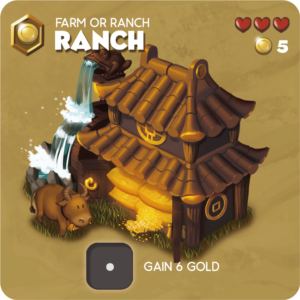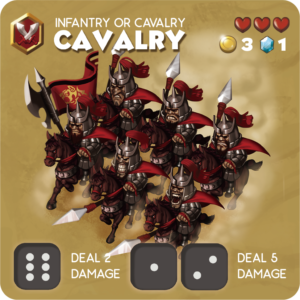Shaolia: Warring States is the first board game made by Bad Comet. It has just come out on Kickstarter and is having some success.
The response of the public of crowdfounders/players has pushed the ludic title to realize 100% of its goal in its first hours of life on the worldwide crowdfunding platform Kickstarter.
DESCRIPTION
In Shaolia: Warring States two fronts will clash on the battlefield to decide who will become emperor of the exotic lands of Shaolia.
The game is meant to be played 1 vs 1 or 2 vs 2 and this game mode gives it an incredible playability making it possible to finish a game in about 30 minutes.
The tactical component of the choices on the battlefield is well balanced with luck and dice rolling.
The game is practically textless, which will benefit both the players who have difficulty with the English language and the very young ones too. An 8-year-old child is practically able to play alone once he has become familiar with the various generals, who are unique to having some text to read.
The cards are in fact understandable even without the text, thanks to a chromatic choice that distinguishes them according to whether we talk about attack, defense, coins, minerals or culture.
The same color choice is also used for generals, so intuitively identifying those that will make it easier to attack or accumulate culture points.

COMPONENTS
Shaolia: Warring States, even though it has no miniatures, is a game with respectable components. The oriental design chosen for the game uniformly characterizes the whole game and is a feature we cannot fail to appreciate!
The tokens are very beautiful, especially the broken hearts that have conquered Gaia! But even minerals make the idea very well with their form of almost magical crystals.
The design and shape of the planks is original and it is a pleasure to “setup the game” by facing the two rival sides against each other, with the tokens in the center within reach of both players.
RULES
The rules of this board game are really simple to understand.
In Shaolia: Warring States we face each other, trying to build and arm the best kingdom to defeat our opponent.
There are two ways to win: destroy the enemy palace and accumulate 18 culture points.
Each game turn is divided into three phases: Purchase, Construction and Action.
There is always a first player, the two opponents will alternate in this role / bonus.
The first player ALWAYS acts first! So in the three phases listed above the game can be explained in:
- the first player buys;
- the second player buys;
- the first player builds;
- the second player builds;
- the first player acts;
- the second player acts;
- the second player is now the first player for the next game turn.
There is no contemporaneity in the game!

The non-contemporaneity in the actions of the players implies that as soon as one of them reaches the victory the game ends! Without leaving, as in other games, the possibility for other players to finish their turn and maybe even to draw.
In fact, in this game there is no draw or other parameters to compare to avoid it.
Non-contemporaneity also allows you to destroy the opponent’s units before they activate and inflict damage themselves.
You could understand that being the first player is a very important bonus and that’s why the two opponents alternate in this role to avoid one being strongly favored over the other.
In the Purchase phase the players can buy:
- level I cards, at the cost of a gold coin;
- 2nd level cards, discarding three cards from their hand;
- an additional die, at the cost of four gold coins and usable ONLY in the next action phase;
- two officers, at the cost of a mineral.
Once the purchases have been concluded by both players, we move on to the second phase, the Construction phase. In this phase, if the construction costs are met and spent, it is possible to deploy the armies and build the buildings purchased in the previous phase.

Of course, more powerful cards are more complicated and expensive to deploy, but they are certainly worth it. Our advice at this stage is not to persist in wanting to build immediately and only the most powerful cards, but to create a base of level cards to be gradually replaced by advanced cards.
The Action phase is certainly the most fun phase of the game. Grab your dice and roll like there’s no tomorrow! The results of the launch will have to be distributed on the cards deployed on your board. Each die used once, as well as each card can only be one-time activity, even if in possession of a double skill and two dice slots.
An exception to this is the Palace, which has three skill slots, can be activated three times and with any dice result. The three slots of the building allow you to generate: two gold coins, two gold coins and two officers.
If at the end of his Action phase the first player has reached 18 culture points or has destroyed the enemy Palace, the game ends immediately. Otherwise the second player can act now and if at the end of his Action phase he too will not have won, he will then become the First Player for the next game turn.
And so on until the end of the game!
FINAL THOUGHTS

Shaolia: Warring States is more than a filler although it is not a heavy and long game. The combination of the strategic part, that also mixes deck building mechanics in the choice of cards and their construction, and of the action part with the throwing of the dice and their placement, makes the game always dynamic and fast. Furthermore, this dynamism combined with the reduced number of players makes this board game fast and free of dead spots.
Gaia like it very much, so as everyone who tried it. The cost is also very low for today’s board games market, just $ 39 plus shipping for the regular version.
We hope many strech goals will be unlocked during the crowdfunding campaign that will make the components and game options even richer!
Kickstarter Campign: www.kickstarter.com/projects/badcomet/shaolia-warring-states
Facebook group: www.facebook.com/groups/shaolia


